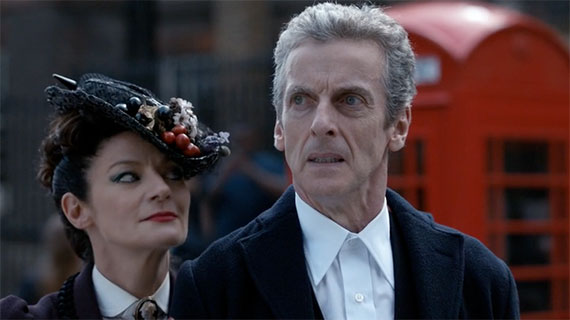Why More Two-Parters Is A Good Thing
Guest contributor Harry O’Driscoll believes the standalone format has been holding things back.

After their absence from Series 7 and most of Series 8 it looks like two-parters are set to increase for Series 9. Steven Moffat has openly stated that he’s doing it to shake up the show, and I think that this will do the show a lot of good.
A constant problem with the revival series has been the single, 45-minute format. Every episode has to establish a new world, characters and ideas, and it simply is too hard to do all of that and tell a good story in 45-minutes. There are a few notable exceptions such as Midnight, The Girl Who Waited and Blink, but too often the stories feel rushed and underdeveloped.
 To take a recent example, Flatline had a great concept that felt unduly rushed. If there was a longer running time you could let’s say, discover that the Boneless really were well intentioned and didn’t know they were harming the humans. That might have made a more unpredictable resolution to the one we got.
To take a recent example, Flatline had a great concept that felt unduly rushed. If there was a longer running time you could let’s say, discover that the Boneless really were well intentioned and didn’t know they were harming the humans. That might have made a more unpredictable resolution to the one we got.
I actually know someone who said he’s considering stopping watching the new series, preferring the slow burn of the classic series. People may prefer the faster pacing of the new series, but was the classic series ever boring?
 Watch an old Doctor Who serial as it was intended – by breaking the episodes apart rather than watching in one go – and a lot of them are well paced and full of incident. The old style serials let you live in a world whereas a lot of the new episodes can only give you a glimpse of it. A good writer can make a script that is unhurried without being dull.
Watch an old Doctor Who serial as it was intended – by breaking the episodes apart rather than watching in one go – and a lot of them are well paced and full of incident. The old style serials let you live in a world whereas a lot of the new episodes can only give you a glimpse of it. A good writer can make a script that is unhurried without being dull.
It would also discourage the writers from penning filler material. If you had, let’s say a series of half a dozen two-parters, then every story would have to be a substantial one. A piece of filler like The Curse of the Black Spot or 42 would have nowhere to hide. Although the classic series was certainly not perfect, every story had to be about something, there was rarely any room for filler episodes.
 With fewer stories Moffat could focus on those who can write good Doctor Who like Neil Cross, Tom MacRae, Jamie Mathieson and Peter Harness. Lesser writers like Chris Chibnall and Stephen Thompson wouldn’t be able to cut the mustard.
With fewer stories Moffat could focus on those who can write good Doctor Who like Neil Cross, Tom MacRae, Jamie Mathieson and Peter Harness. Lesser writers like Chris Chibnall and Stephen Thompson wouldn’t be able to cut the mustard.
To my mind there are also advantages from a production perspective, although I won’t pretend to be an expert in TV production. Having less stories would save money by needing less sets and guest cast, it also means the BBC could get its money’s worth from their guest stars. The economies of scale mean the series could be less dependent on cheap episodes.
I wouldn’t rule out single parters altogether, because I believe the length should be tailored to the story instead of the other way around. But lately the 45-minute format has held the series back too much. Moffat’s right that it runs the risk of making things predictable and I think a more serialized format would definitely be a welcome change.








